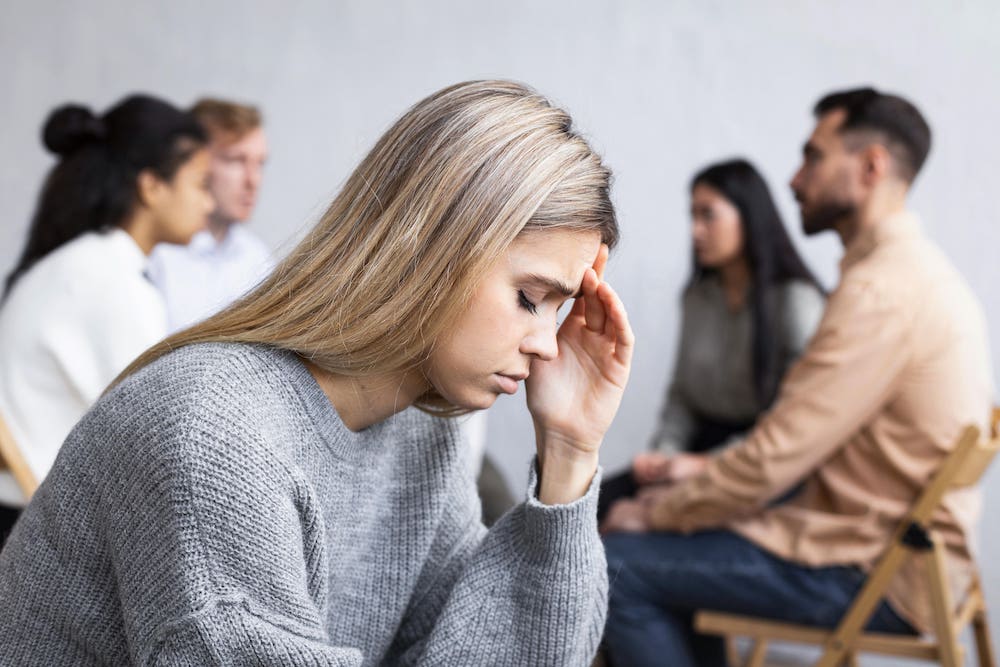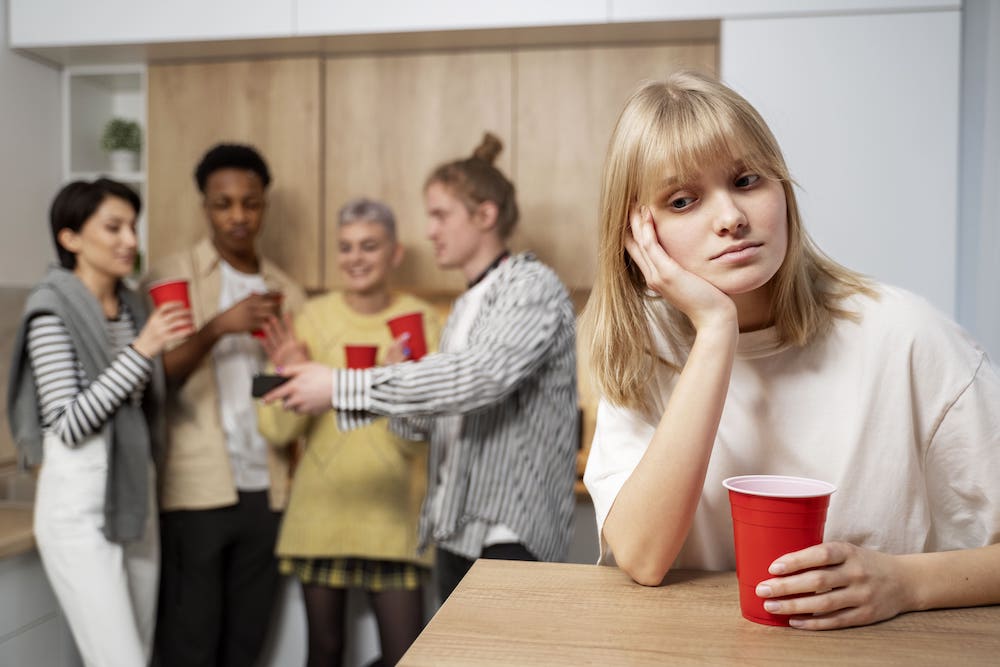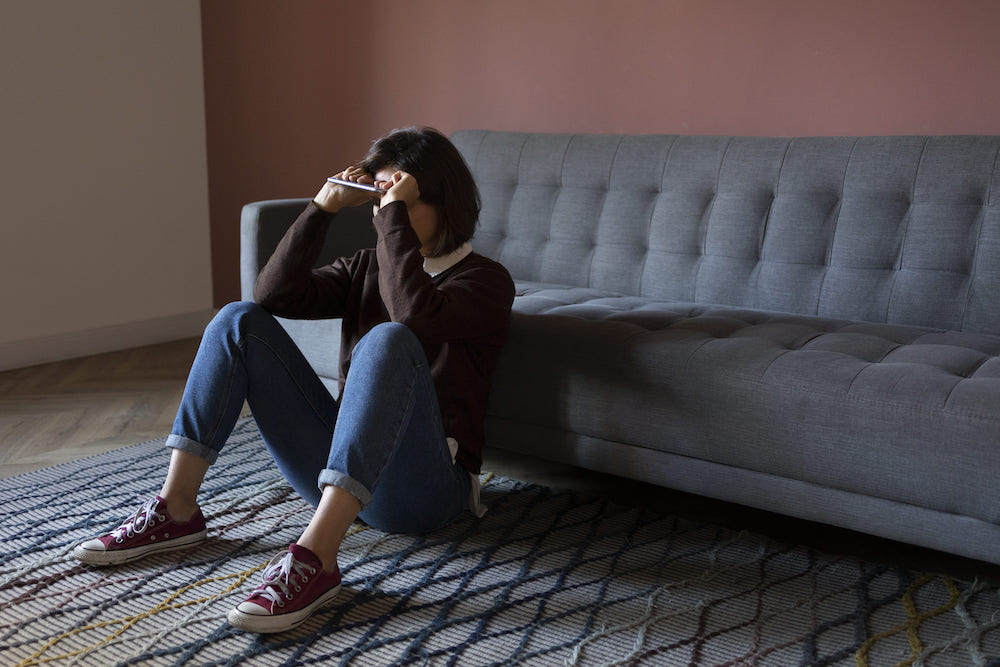
At first glance, it may be difficult to discern the difference between agoraphobia vs social anxiety. While both anxiety disorders can result in avoidance of certain situations, social anxiety involves social situations and agoraphobia involves places.
To understand the difference between these conditions, we’re going to dive deeper into their common symptoms, causes, treatments and more.
Announcement: While similar in many ways, agoraphobia and social anxiety are two separate conditions with differing triggers, treatments and diagnostic criteria. Social anxiety involves social situations. Agoraphobia involves places. In this article, we explore agoraphobia and social anxiety to help you navigate these conditions and take steps to break free from fear.
Understanding Agoraphobia
Agoraphobia is an anxiety disorder. Individuals with this condition often experience anxiety, fear and avoidance of certain places or situations. Triggers can include:
- Enclosed spaces
- Open spaces
- Public transportation
- Being away from home
- Crowds
The level of anxiety or fear experienced by a person with agoraphobia is disproportionate to the actual danger posed by the situation.
Common Symptoms and Causes
When a person with agoraphobia is in a triggering situation, they may experience:
- Chest pain or racing heartbeat
- Headache
- Dizziness
- Labored breathing
- Shakiness
- Sweating
- Feeling like you’re out of control
- Nausea
The exact cause of this condition is not well understood. However, experts believe that it may be a combination of psychological and biological factors, such as:
- Having a more intense “fight or flight” response
- Experiencing a stressful event, such as job loss, divorce or bereavement
- A history of mental illness
- Being in a relationship with a controlling partner or being in an unhappy relationship
- A traumatic childhood, such as a history of sexual abuse or the death of a parent
Some individuals develop agoraphobia even without a history of panic disorder. In these cases, the condition may be triggered by irrational fears, such as:
- Doing something that would cause embarrassment or humiliation
- Being the victim of a crime or attack if you leave the house
- Being infected by an illness of visiting a crowded place
Impact on Quality of Life
Agoraphobia can become a debilitating condition. People with severe cases of this condition may not be able to leave their home or certain rooms of the house without experiencing a panic attack.
The anticipation of feeling anxiety or fear is enough to keep them in their safe environments. They may be reluctant to leave their home or venture out into new areas that are unknown.
Individuals with agoraphobia may also develop:
- Low self-esteem and loss of confidence
- Depression
- Alcohol or drug dependence
If left untreated, activities outside of the house, such as socializing, going to work, engaging in hobbies or even visiting the park, become out of reach. Over time, the individual’s safe environments grow smaller and smaller. Often, those with agoraphobia recognize that their fears are irrational, but they feel powerless to overcome it.

Understanding Social Anxiety
Social anxiety is also an anxiety disorder, but rather than having a fear of places, these individuals have a fear of social situations. More specifically, social anxiety is having a fear that you will do something to embarrass yourself in a social situation or be rejected by others.
Triggers can include:
- Social gatherings
- Public speaking
- Going out on dates
- Interacting with strangers
- Eating in front of others
- Starting conversations with others
- Parties
- Returning items to a store
- Visiting a public restroom
- Situations where you are the center of attention
Individuals with social anxiety may go out of their way to avoid situations in which they have to interact with strangers or even initiate conversations out of fear of being embarrassed, judged or rejected.
Common Symptoms and Causes
When encountering a social situation, people with social anxiety may experience:
- Intense anxiety
- Blushing
- Rapid heart rate
- Sweating
- Trembling
- Dizziness
- Difficulty breathing
- Muscle tension
The cause of social anxiety is not well understood. It is believed that genetics may play a role in the development of this condition. If you have a family member with social anxiety, you may be at a higher risk of developing it yourself.
Other risk factors can include:
- Negative social experiences during childhood, such as being bullied, rejected, ridiculed or teased.
- A history of family conflict, abuse or trauma.
- Being timid, shy or withdrawn.
Impact on Quality of Life
Social anxiety can disrupt normal daily activities, like going to work or socializing in public. People with this condition may avoid a variety of social situations, which can have a negative impact on their quality of life.
For example, social anxiety may drive someone to avoid going to the gym or attending a friend’s wedding. They may find it difficult to change jobs or may not reach their full potential at work due to fear of having to interact with strangers or public speaking.
If left untreated, social anxiety can lead to:
- Poor social skills
- Isolation
- Severe depression
- Hypersensitivity to criticism
- Negative self-talk
- Difficulty being assertive
- Poor self-esteem
The Similarities Between Social Anxiety vs Agoraphobia
As you can see, social anxiety and agoraphobia have similar symptoms and can both have a significant effect on the quality of your life.
Both conditions can lead to:
- Avoidance of situations, such as being in open spaces or having to interact with strangers on the bus.
- Feelings of fear that affect your social life. A person with agoraphobia may be fearful of being in restaurants, and a person with social anxiety may be fearful of eating in front of others. In both cases, fear affects the person’s social life.

Often, people with agoraphobia also suffer from social anxiety. In fact, one study found that these two disorders occurred together 68% of the time.
Agoraphobia vs Social Anxiety: The Main Differences
While similar, agoraphobia and social anxiety are still two separate conditions. Let’s explore the difference between agoraphobia and social anxiety on a deeper level.
Diagnostic Criteria
In terms of diagnostic criteria, the primary difference between agoraphobia and social anxiety is the source of the fear itself.
For example:
- Agoraphobia: Disproportionate fear when facing at least two different situations, such as crowded areas or open spaces.
- Social Anxiety: A persistent fear of performance or social situations involving unfamiliar people or exposure to possible scrutiny by others.
Causes
Both anxiety disorders can be caused by trauma or genetics. However, social anxiety is often the result of negative experiences in social situations, such as:
- Teasing or bullying by peers
- Family trauma or divorce
- Emotional, physical or sexual abuse
- Death of a parent
Agoraphobia can be caused by:
- Lack of spatial awareness
- Overactive fight or flight response
- Certain personality types, such as those who crave approval or control
Symptoms
Both conditions can cause similar symptoms, but the primary difference is the trigger of these symptoms.
- Agoraphobia involves fear of certain places
- Social anxiety involves fear of social situations
Treatment and Management Strategies
Treatments and management strategies for both disorders are very similar and typically involve the use of both medication and cognitive behavioral therapy (CBT).
However, with agoraphobia, there is often the addition of exposure therapy. Exposure therapy is done gradually over time, so the individual can see that there is no real danger or reason to be fearful.
Summing Up
It can be challenging to determine whether a person has agoraphobia or social anxiety, as these conditions often co-occur. The good news is that both of these anxiety disorders respond very well to treatment. If you feel that you may have social anxiety and/or agoraphobia, reach out to get professional help today and take your first steps to breaking free from the chains of fear.